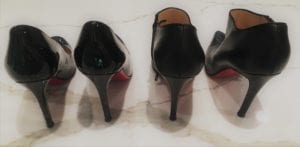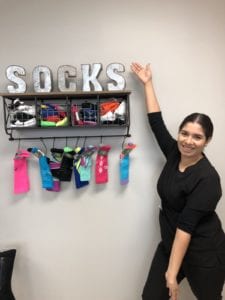If you're looking at your shoe closet wondering, do high heels cause spider veins, you're no alone! So many women have closets packed with high heels. Let's face it, stilettos can be great--they  make your legs look longer, they give you extra inches, and they add a stylish finish to almost any outfit.
make your legs look longer, they give you extra inches, and they add a stylish finish to almost any outfit.
That's the good news about high heels...but here's the not-so-good news. While wearing high heels won't directly cause you to develop varicose veins, they can contribute to this problem by affecting blood flow in your veins. And, not surprisingly, the higher the heels, the bigger the negative impact on your vein health.
To understand the connection between high heels and varicose veins, we must first understand this problem and why it happens.
Over 25 million Americans have varicose veins. Some people will recognize the problem right away, thanks to visible symptoms like bulging veins or brightly colored veins that are visible on the skin's surface.
Some symptoms of varicose veins are less obvious: heaviness, aching, swelling, tiredness, burning, stinging, and leg cramps are all signs that you may have a problem. Other symptoms, like swollen legs, changes in your skin and even ulcers are also symptoms of spider veins, but they can often be mistaken for other conditions.
Varicose veins are a faulty part of the venous system, which is just a group of pipes, pumps, and valves in your body. Veins are 'pipes' for blood. Valves are like stop signs that keep the blood flowing in the right direction--either up to your heart or away from your heart to your other body parts.
When any part of your venous system stops doing its job properly, blood can begin to pool in your veins, causing them to stretch and bulge. That's when you may notice symptoms of varicose veins.
When you walk, blood starts pumping in your foot and calf. Blood starts moving up the veins in your legs. Valves help that blood fight gravity and keep flowing up towards your heart.
Of course, that's the case when your're walking normally. When you stride wearing basic, supportive shoes, your foot and calf work together. Veins in your foot fill it with blood as it lifts off the floor. When your heel and arch land back on the floor, that blood starts flowing into the relaxed veins in your calf. Once there, your calf muscles get to work, pushing blood into the deep veins in your legs.
High heels are a game changer in this system because of the way they affect your stride. When you're rocking those three-inch stilettos, your heel never touches the ground. All your weight stays in your toes and the balls of your feet. Plus, because of the angle of your body, your calf muscles never get the chance to relax when you're in heels.
The result of these stride changes is fairly significant. Your foot gets less filled with blood; your calf muscles are less effective when they try to pump blood up to your heart. The decreased pump strength can leave some blood behind in your legs, allowing it to build up and pool in your veins. When this happens, your vein health may suffer.

While no one expects you to give up high heels completely, there are steps you can take to limit the damage to your veins:
While high heels don't directly cause spider veins, they may create an environment that compromises your overall vein health. If you already have spider veins, or have a family history of vein disease, keeping a close watch on your shoe closet is a very good idea. You should also consider scheduling a consultationscheduling a consultationscheduling a consultation with our team of Houston and Dallas area vein specialists. Using diagnostic ultrasound, we can get a better picture of your current state of vein health, letting you know if you need any help preventing or treating faulty veins!

Scheduling
Please contact our dedicated specialists to schedule a consultation today.
2024 Texas Endovascular. All rights reserved. Website Design by Healthcare Success